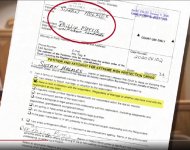Other than someone in the clerk's office calling and saying "there's a person here filing an RFL petition against you", there wouldn't be a mechanism for the respondent to know that a petition is being started. The order issuing from the court at the first hearing should have to be served on the respondent in order to be effective.
Is that what the sheriff wouldn't serve here?
I get that but the sheriff wouldn't act on the order until the initial judge issued it, correct? I see in other states, the RF is filed, the LEO seizes the guns THEN it goes to a judge. In Colorado, to a judge first, correct? The judge saw the claim was bogus, threw it out..so the LEO had no order to execute..
Had the law "worked correctly," an order would have been issued and Morris' weapons seized and held for two weeks until a hearing, at which time the order would undoubtedly have been rescinded
My point, isn't that initial order in CO issued by a Judge?..NOT by a LEO?Guns seized if appropriate then BOTH parties go before a judge in 2 weeks
to plead the case?

